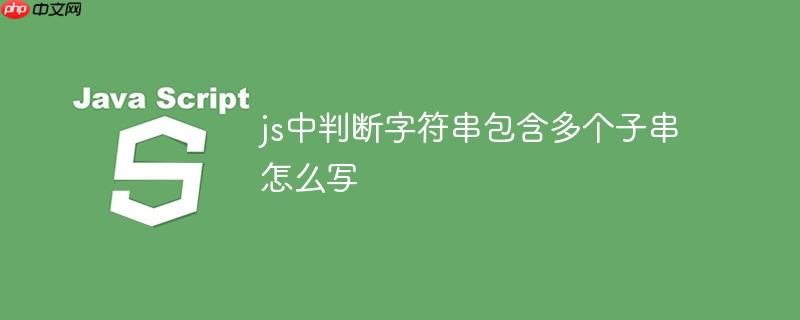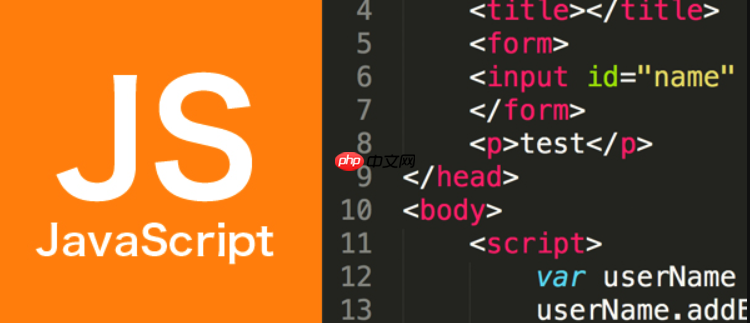判断字符串是否包含多个子串的方法是循环验证每个子串是否存在,优化方式包括使用正则表达式或预处理字符串。1. 使用正则表达式可减少多次搜索的开销,适用于子串数量多或需复杂匹配的情况,并需转义特殊字符;2. 预处理字符串适用于多次判断不同子串组合的场景。选择 includes 更简洁易读,而 indexof 可获取具体位置。大小写敏感问题可通过统一转换大小写解决,但需注意性能影响。此外,还需处理空值、边界情况、性能瓶颈及防止正则注入,以提高代码健壮性。

判断一个字符串是否包含多个子串,核心在于循环遍历待查找的子串,并逐一验证它们是否存在于目标字符串中。需要注意的是,效率和代码可读性需要权衡。

function containsAll(str, substrings) {
if (!str || !substrings || substrings.length === 0) {
return false; // 或者根据你的业务逻辑返回 true
}
for (let i = 0; i < substrings.length; i++) {
if (str.indexOf(substrings[i]) === -1) {
return false;
}
}
return true;
}
// 示例
const myString = "This is a test string containing multiple keywords.";
const keywords = ["test", "string", "keywords"];
const result = containsAll(myString, keywords);
console.log(result); // 输出: true
const keywords2 = ["test", "string", "invalid"];
const result2 = containsAll(myString, keywords2);
console.log(result2); // 输出: false优化的关键在于减少不必要的循环和字符串搜索。如果子串数量非常大,可以考虑使用正则表达式或者预处理字符串。

1. 使用正则表达式:

如果子串之间有某种模式,或者需要更复杂的匹配规则,正则表达式可能更高效。
function containsAllRegex(str, substrings) {
if (!str || !substrings || substrings.length === 0) {
return false; // 或者根据你的业务逻辑返回 true
}
const regexString = substrings.map(s => `(?=.*${escapeRegExp(s)})`).join('');
const regex = new RegExp(regexString);
return regex.test(str);
function escapeRegExp(string) {
return string.replace(/[.*+?^${}()|[]\]/g, '\$&'); // Escape special characters
}
}
// 示例
const myString = "This is a test string containing multiple keywords.";
const keywords = ["test", "string", "keywords"];
const result = containsAllRegex(myString, keywords);
console.log(result); // 输出: true
const keywords2 = ["test", "string", "invalid"];
const result2 = containsAllRegex(myString, keywords2);
console.log(result2); // 输出: false注意: 正则表达式的构建和匹配本身也有开销,所以只在子串数量多或者需要复杂匹配时才考虑。另外,escapeRegExp 函数用于转义正则表达式中的特殊字符,防止它们被错误解析。
2. 预处理字符串:
如果需要多次判断不同的子串组合,可以先对目标字符串进行预处理,例如构建一个字符索引。但这通常只在特定场景下才有意义。
indexOf 和 includes 的选择?在大多数情况下,includes 和 indexOf 的性能差异可以忽略不计。includes 更具语义化,代码可读性更好。indexOf 返回索引,可以用于更复杂的操作,例如查找子串的具体位置。
const myString = "This is a test string.";
// 使用 includes
const containsTest = myString.includes("test");
console.log(containsTest); // 输出: true
// 使用 indexOf
const indexOfTest = myString.indexOf("test");
console.log(indexOfTest); // 输出: 10
if (myString.indexOf("test") !== -1) {
console.log("String contains 'test'");
}选择哪个取决于具体需求。如果只需要判断是否存在,includes 更简洁。如果需要知道子串的位置,indexOf 更合适。
默认情况下,JavaScript 的字符串比较是大小写敏感的。如果需要忽略大小写,可以在比较之前将字符串和子串都转换为小写或大写。
function containsIgnoreCase(str, substring) {
return str.toLowerCase().indexOf(substring.toLowerCase()) !== -1;
}
// 示例
const myString = "This is a Test string.";
const result = containsIgnoreCase(myString, "test");
console.log(result); // 输出: true注意,频繁的大小写转换可能会影响性能,尤其是在处理大量数据时。可以考虑只在必要时进行转换。
在编写代码时,需要考虑一些边界情况和潜在的错误,例如:
null / undefined: 检查输入字符串和子串是否为空或无效。true;如果认为“没有任何子串存在”,则返回 false。escapeRegExp 函数转义特殊字符。清晰地处理这些情况可以提高代码的健壮性和可靠性。
以上就是js中判断字符串包含多个子串怎么写的详细内容,更多请关注php中文网其它相关文章!

每个人都需要一台速度更快、更稳定的 PC。随着时间的推移,垃圾文件、旧注册表数据和不必要的后台进程会占用资源并降低性能。幸运的是,许多工具可以让 Windows 保持平稳运行。

Copyright 2014-2025 https://www.php.cn/ All Rights Reserved | php.cn | 湘ICP备2023035733号